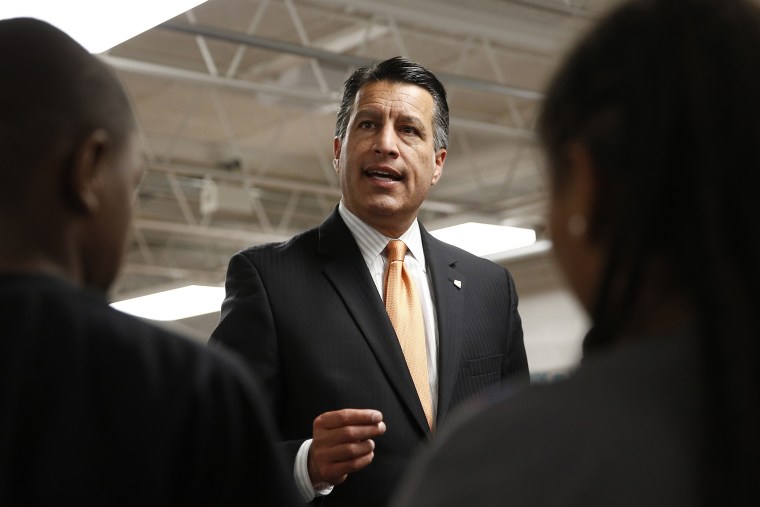When four Republican senators unveiled the Graham-Cassidy health care plan last week -- yes, it really was just last week -- a reporter asked the quartet if they'd secured the support of governors who'd been skeptical of previous repeal plans. Sen. Dean Heller (R-Nev.) replied that it was still a "work in progress."
A week later, we can now say those efforts failed spectacularly. The Nevada Independent reported last night:
Gov. Brian Sandoval said Thursday that the flexibility fellow Republican Sen. Dean Heller promised will be good for Nevada in a health-care bill he’s sponsoring is a “false choice” because the legislation will also slash funding.Sandoval, in a statement to The Nevada Independent, said he would not “pit seniors, children, families, the mentally ill, the critically ill, hospitals, care providers or any other Nevadan against each other” because of the steep cuts to federal funding the state would face if the Heller-sponsored measure were to pass. A state analysis, also obtained by The Nevada Independent, agrees with independent calculations from various health-care organizations estimating Nevada will lose between $600 million and $2 billion in federal funding by 2026 if the legislation passes.
Sandoval is hardly alone. Even if we put aside criticism from Democratic governors -- whom GOP senators are inclined to ignore -- the number of Republican governors who are publicly opposed to the Graham-Cassidy plan continues to grow.
We noted the other day that GOP governors representing Ohio, Nevada, Maryland, Vermont, Massachusetts, and New Hampshire have rejected the proposal. Soon after, New Jersey's Chris Christie (R) said he's against it, too. A day later, New Mexico's Susana Martinez (R) also gave the legislation a thumbs-down.
At one point this week, Sen. Bill Cassidy (R-La.) reportedly suggested his home state governor, Louisiana's John Bel Edwards (D), wasn't opposed to his repeal bill. Edwards disagreed, making clear he's against it, too.
It's worth keeping in mind that from the perspective of Senate Republicans, governors should love the Graham-Cassidy plan. After all, more so than every other GOP repeal bill, this bill empowers state officials to do as they please. The freedom and flexibility is supposed to be a selling point for governors and other state policymakers.
But officials who actually work at the state level know better.
In 2003, health care policy makers in Massachusetts agreed that the state should build a system to expand coverage to its uninsured residents. It took four years before Romneycare was fully up and running.In between, politicians had to think hard about how they wanted the system to work: how money would be raised and spent, what benefits would be offered, whether and how markets should be used to distribute coverage, whether people who didn’t buy coverage should be penalized. They had to build a computer system to help people check their eligibility and understand their options. They had to recruit insurers to participate. And they needed to find uninsured residents and persuade them to enroll.A new health care bill before the Senate would require all the states in the country to make a similar soup-to-nuts evaluation of how they’d like their health care systems to work, to build such a system and be ready to open their doors in substantially less time -- just over two years.
There's no shortage of reasons to oppose the Republican plan, but for many state officials, the chaos Graham-Cassidy invites is a pretty strong incentive. Is it any wonder there's a bipartisan group of governors pushing for the bill's demise?
